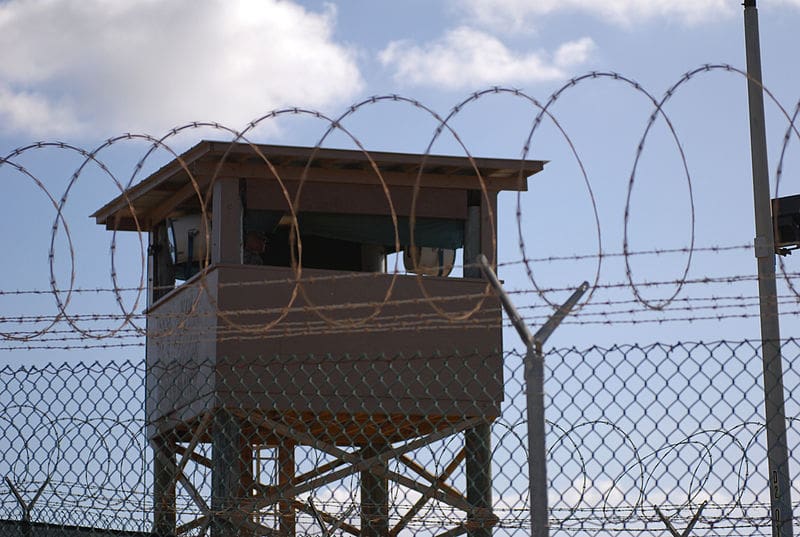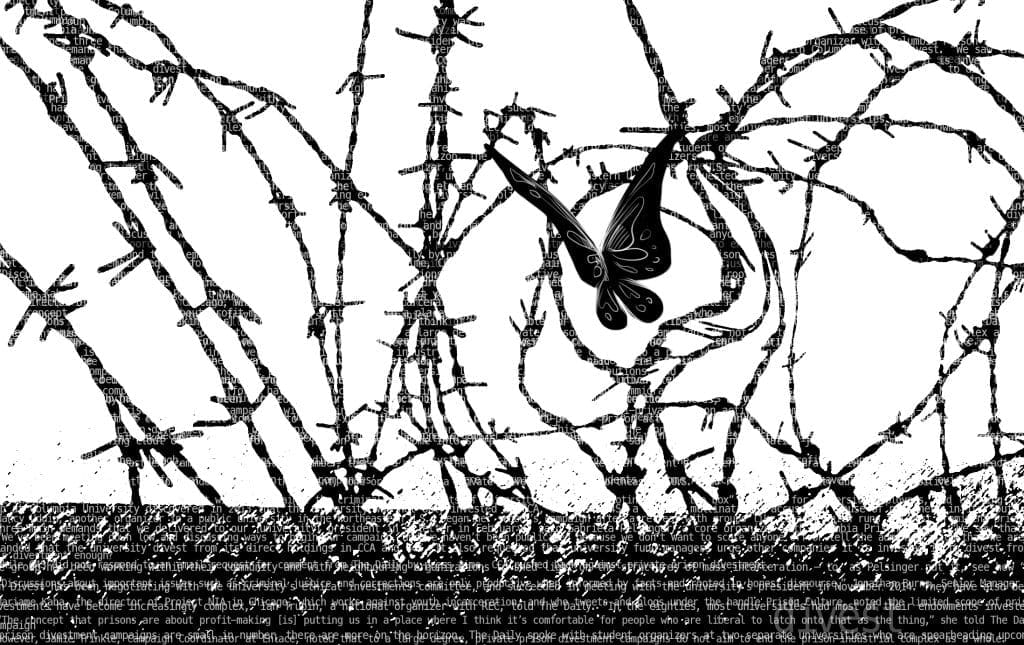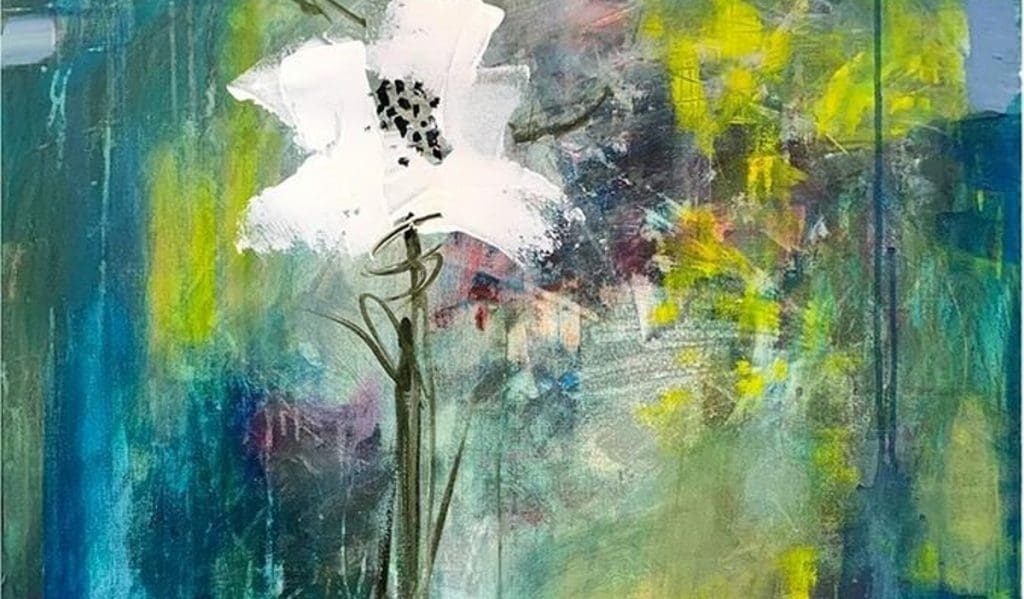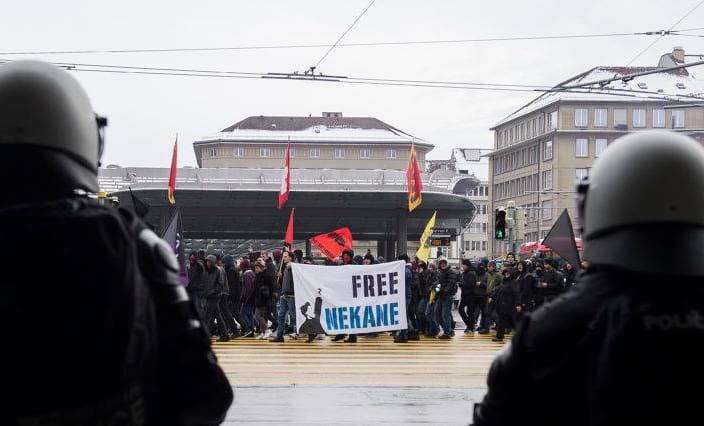Transcribed from the 8 February 2015 episode of This is Hell! Radio and printed with permission. Edited for space and readability. Listen to the whole interview:
“I thought it was just another detainee holding facility. But we knew that it was not on the map; this was not on the books. The soldier with me said, ‘We just found our Auschwitz.’ It shook all through my body, and I said, ‘Let’s get out of here.’”
Chuck Mertz: Guantánamo is a horrible place that should be closed, never should have been opened in the first place, and may very well have been the scene of a triple murder. Here with an insider’s account, Joseph Hickman is author of Murder at Camp Delta: A Staff Sergeant’s Pursuit of the Truth About Guantánamo Bay.
Joe has spent most of his life in the military—first as a marine, then as a soldier in both the army and the national guard. Deployed on several military operations throughout the world, sometimes attached to foreign militaries, the recipient of more than twenty commendations and medals, Joe was awarded the Army Achievement Medal and the Army Commendation Medal while he was stationed with the 629th military intelligence battalion in Guantánamo Bay. He is currently working as an independent researcher and senior research fellow at Seton Hall Law School’s Center for Policy and Research.
You start your book by writing, “I am a patriotic American.” Is this a book written out of a sense of patriotism? Is this a patriotic book?
Joseph Hickman: Yes. I do believe it is. Like you said, I was in the military for fourteen years when I arrived at Guantánamo. It was my life. And I believe that, as an American soldier, it was my job to come forward and report a war crime. I think it’s every soldier’s duty to report a war crime if they see one occur. I believe I witnessed a war crime, and I tried to report it.
CM: You say that you started thinking about your oath to the constitution when you were a guard at Guantánamo, and wondering whether you were actually following this oath to defend of the laws of the United States.
Did you ever have discussions with comrades, with other soldiers, with people there, thinking, “is what we’re doing legal?”
JH: Yes. With the men in my squad, we all started questioning it right from the get-go. As soon as you arrive in Guantánamo, it is a huge culture shock for anyone. I’d never questioned my oath as a soldier to protect and defend the constitution of the United States, and that means even if I have to die for it. But when I went to Guantánamo, that was the first time.
On the first day, I went into a tower and looked down on the detainees that were being held there. I saw these people that are held in six-by-eight cells, and I knew they had been there for years prior to me getting there. There was the worst smell coming from this place. You heard people screaming, crying. Detainees trying to wrack the navy guards’ nerves, the guards trying to get on the detainees’ nerves. And then when night falls, you hear the rats. Guantánamo is overrun with rats. You hear them trying to dig into the cells where the detainees are living.
I worked in prisons prior to going to Guantánamo; I was a prison guard in Baltimore. And I knew that this was not how we should treat detainees, and it was going against our constitution and due process and everything else. So I was really questioning what I was witnessing.
CM: How different is it from US prisons? Prisons don’t have a very good reputation. So how different is it from the prison that you worked in, in Baltimore?
JH: Well, right off I saw the mind games that went on, that we don’t really have in US prisons. US prisons are not good, don’t get me wrong. But these detainees were in six-by-eight cells, and they were allowed just one hour of rec time a week. And what they considered “rec time” is moving them out of their six-by-eight cells and putting them into a twelve-by-twelve fenced-in area, where they had a soccer ball in the middle. And they were allowed to play with the soccer ball, but the soccer ball couldn’t touch the fence at any time. If it did, then their one hour of rec time per week ended right away.
It was just this sick mind game that they were playing with these people. And most of them, when they got into the twelve-by-twelve cell, they just walked in circles like you would see an animal doing in a zoo. It is so inhumane that my first couple days in the tower, I just snuck out. I couldn’t watch any more of what we were doing to these people.
CM: Do you fear that this kind of treatment might be coming to US prisons? When the Abu Ghraib scandal broke, there were some who were saying that the people involved in that horrible crime were people from US prisons, and that maybe they had learned these horrible practices in US prisons.
Then the other concern was that what takes place in a theater of war will often come home to the United States. We had a professor on the show by the name of Alfred McCoy who made that argument back in 2004 about drones, and we’ve seen the huge increase of drones being used domestically here in the US.
So do you fear that what is taking place in Guantánamo may either seep out into US prisons, or that it might be reflective of how US prisons already are?
JH: If it ever hits the US prisons, it would be horrible. I mean, the US prison system is bad now. It would be much worse then. In some ways, we’ve already seen this in US prisons a little bit. One of the interrogators down in Guantánamo was named Richard Zuley. Richard Zuley is a homicide police detective from Chicago. He was a navy reserve officer; he got stationed in Guantánamo and he was in charge of a special missions unit for harsh interrogation techniques.
So we sent this Chicago police officer down to Guantánamo to interrogate people. This same Chicago police officer right now is being sued in court for falsely imprisoning a person for nineteen years, making false statements and everything else. So it’s just a mess. We’ve brought some of what’s here down there, and I’m afraid a lot of what we’re doing down there will come here.
CM: What was your biggest misconception about Guantánamo before you got there? What was the biggest thing that you found out just was not the case?
JH: When I first went down there, I thought war had changed, and people just didn’t understand that this wasn’t World War Two or even Vietnam anymore. This was a totally different kind of war, with people that aren’t in uniform, people that don’t belong to an official military from a recognized government. That’s where my confusion was based.
But when I started really digging into the Geneva Convention, when I started questioning what I was seeing, I realized that the Geneva Convention also covers what’s called “freedom fighters.” This was basically from World War Two, when the French resistance was attacking and bombing German soldiers and Nazis. They were not uniformed soldiers, but they were some sort of enemy combatant, and the Geneva Conventions applied to those people.
Now, to the Germans in World War Two, the French resistance was basically a terrorist group. So the Geneva Conventions should apply to enemy combatants as well, even if they’re held in Guantánamo, under that section of the rules.
CM: That makes a lot of sense, and I’m kind of surprised that we haven’t heard anybody make that argument before.
But I have always had this dilemma in my mind about a soldier’s position in seeing a crime being committed. Or if you’re a police officer, you know? The other people around you depend on you every day, and you’re in the military, you take orders. How much freedom do you really have—or do you feel that you have—to report a crime?
JH: To do it is very uncomfortable. You feel a lot of pressure. You know that people are going to come out against you. You know you’re going to piss off your command. But you always have to go back to your oath you took as a soldier. You always have to go back to why you joined. You joined to make the world a better place, and to return to the United States and make it a better place.
Unfortunately, people feel that pressure and they back off from reporting crimes. But it’s the right thing to do, and you just have to remind yourself of who you are.
“They would have had to tie their own hands and feet together, stuff rags down their own throats to the point of gagging, put masks over their own faces, hang a noose from the ceiling or the side of the cellblock wall, jump into that noose while they were all tied up and gagged and masked, and hang themselves for over three hours. Without a guard noticing.”
CM: When you’re walking around Guantánamo, you find what you call “Camp No,” which later becomes known as “Penny Lane” in the press. What occurs at that base, and how did you find it?
JH: I’m going to be honest to your listeners, a little more honest than I was in the book, I think. We were exhausted, one day, me and two other soldiers that were in a humvee. We were looking for a place to rest; I was going to let my guys sleep a little bit. We had a radio in the car; we were on mobile patrol. I figured if something happens, I’ll be five minutes away, I can hear it on the radio, I can get somewhere quickly. I just want to get my guys some rest.
So we were looking for a shady spot. We went way into the brush in Gitmo, just outside of Camp America, where we weren’t supposed to be. And I found a place with heavy brush where we could get some shade. It was ninety, a hundred degrees that day. I got out and I saw a fence that had signs on it: “No Photographs,” “Do Not Enter.” It was a fence with concertina wire on the other side. And I was curious. What is this place?
Another guard who I was with was curious as well. So we took a little walk along the fence. And as we got closer to one area of the fence line we saw a facility there that was obviously—it was without question a detainee holding facility, resembling the other ones inside Camp America, like Camp Five and Camp Echo. We knew that this was not on the map; this was not on the books. What is this place? It looked just like one of the KBR facilities that was like any other prison.
So I’m looking at it, and the soldier that was with me said, “Do you know what we just found?” And I said, “Well, what do you think it is?”
I thought it was just another detainee holding facility. He said, “We just found our Auschwitz.”
And it just shook all through my body, and I said, “Let’s get out of here.”
CM: So let’s get to the night of June 9th, 2006. You are on duty, filling in as sergeant of the guard. And you see three detainees being taken to what you call Camp No, what people might know as Penny Lane. Later the base goes into crisis mode; a superior officer tells you the three men have committed suicide. The next day, the story changes. Instead of choking themselves with rags, they’ve now hung themselves, which would seem more believable than choking yourself with rags…but could they have hung themselves?
Even leaving aside your investigation and what you found out, to what degree is the notion that they hung themselves even possible, in your mind?
JH: It’s completely impossible. I’ll just say this. There were 485 detainees at Guantánamo at the time. There were close to 1200 guards. That’s three guards to every one detainee, roughly.
Imagine what these detainees would have had to have done that night if it were true. They would have had to tie their own hands and feet together, stuff rags down their own throats to the point of gagging, put a mask over their own faces, hang a noose from the ceiling or the side of the cellblock wall, jump into that noose while they were all tied up and gagged and masked, and hang themselves for over three hours. Without a guard noticing.
The guard force is required to check on every detainee every three minutes. Yet these detainees supposedly hung there for three hours, and were transported to the detainee medical facility with rigor mortis.
It just could not have happened.
CM: And then the other thing is they don’t send the throats of the three detainees when they send their bodies home. The father of one of the detainees is a police chief in Saudi Arabia—who you have dedicated the book to—obviously thinks something is weird.
So first it’s rags, second it’s hanging, third their throats are gone so no autopsy is possible. I mean, you’ve done security in the private sector and with the military. How poorly was this covered up?
JH: It was covered up very poorly, but they depended on people’s anger and frustration against an enemy that most people don’t understand.
They were depending on soldiers, reminding soldiers, “Hey, you signed a non-disclosure agreement when you came down here. You can’t tell anyone about this.” They depended on a few things like that. But I just couldn’t stand by and watch that happen.
“I never realized how quickly history could be manufactured. Half of the reporters covering the military should have just enlisted.”
CM: The three victims were Yasser Talal Al-Zahrani—you have dedicated the book to his father—Salah Ahmed Al-Salami, and Mani Shaman Al-Utaybi. You said the one thing all three detainees had in common was they were hunger strike leaders: “The one thing the interrogators can’t stand is hunger strikes, because detainees can’t be interrogated, and they were doing 200 a week. When they do hunger strikes, they cripple the intelligence process.”
Are you suggesting that the three people who you allege were murdered were actually targeted for death?
JH: Yes, I think they were. There was a fourth detainee tortured that day, Shaker Aamer, who was another hunger strike leader. But he’s a British citizen; there was a lot of attention on him, so they couldn’t necessarily get rid of him so easily. But Shaker Aamer wrote an affidavit to his attorney describing a lot of the things that also happened to the others—a mask over his face, the blocking of his airway. But he survived.
CM: You write how in an “article that questioned my credibility, NBC Pentagon correspondent Jim Miklaszewski was quoted as saying, ‘I devoted a lot of time to Hickman’s allegations, and my conclusion was that it just didn’t seem possible that that many people could have been involved in a conspiracy and have it remain secret. It stretched all credulity, I thought.’ Of all the critical comments made about me, Miklaszewski’s was the only one that bothered me. It bothered me because it seemed so reasonable.”
His remark does sound incredibly reasonable. How much of a challenge is it for you to tell the story?
JH: I don’t blame the press for coming to their conclusions. The military gave a response that said I was a perimeter guard, which means I was never in the camp. And that is not true. I was a perimeter guard, but I also had duties inside of Camp Delta, which they never told the press. I was in Camp Delta, where the detainees are held, a little more than fifty percent of the time.
And having perimeter duties was actually beneficial to my account, not a negative thing. Because I was able to see the detainees when they were transported to Camp No. Being able to leave Camp Delta and see where they went was an advantage, not a disadvantage.
So I don’t blame the press, because they went by what the government said. The government said I was a perimeter guard, and that there was no way I could have seen what I saw. That was just a lie.
They also said that so many people couldn’t have come up with the same story. Well the fact is, there were five people on duty that night in the guard force that was watching that cell block. All five, after the deaths occurred, were accused of making false statements and read their Miranda rights when they were explaining what happened that night. We have never seen those original statements. They were rewritten. And that’s very concerning.
CM: As you’re pointing out, the dominant media reporters who cover the Pentagon are not quick to report anything that is critical of the military, and they report more or less anything that the military wants them to report. They are generally stenographers for the DOD, which is truly a shame.
You write, “I never realized how quickly history could be manufactured. Half of the reporters covering the military should have just enlisted.”
Is that what you fought for as a marine, as a soldier? As somebody in the military, how do you want American press freedom to be exercised? As people who are cheerleading for the military, showing their support for the troops? Or as people who are objective journalists and possibly at times being very critical of soldiers overseas?
JH: I want them to be critical. If we do something wrong, call it out. Keep everyone in check. It’s what we have to do.
The press can play a huge part in making America better. And sometimes it’s done so, by reporting things that are not necessarily good. Soldiers can learn from that. Soldiers can learn from their mistakes. But you have to give them a chance. Don’t keep covering things up.
They’ve said there were too many people that had to have been involved to cover up this crime. Well, there were 152 people that covered up that Pat Tillman actually died by friendly fire. 152 people kept that a secret. That’s far more than had to have kept the secret at Guantánamo. The press has to start being objective about what soldiers are doing and what’s going on, on the battlefield.
CM: One last question for you, Joe, and it’s our Question from Hell: the question we might hate to ask, you might hate to answer, or the audience is going to hate your response.
How much less secure do you think the United States is because of the existence of Guantánamo Bay?
JH: I think it’s way less secure. By having Guantánamo Bay open, we are manufacturing terrorists.
CM: Thanks so much for being on our show, Joe.
JH: Thank you.





